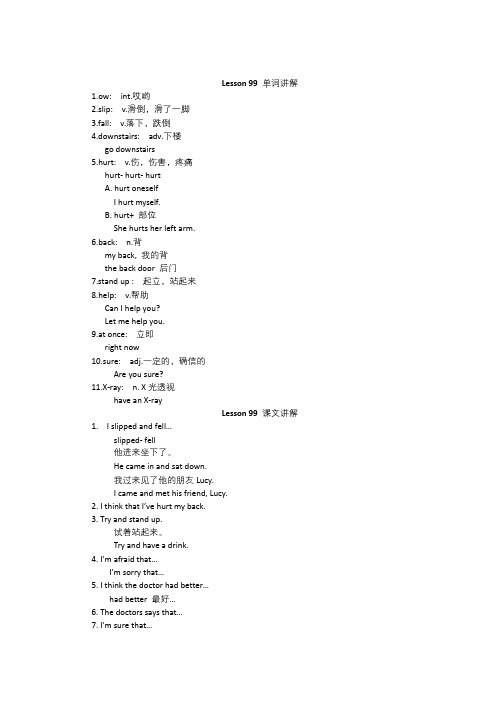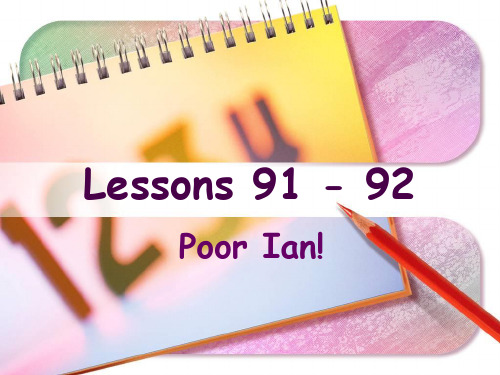新概念第一册第9课
新概念英语第一册第9-10课课件

B: Not so good . 不是很好。
Not bad.
一般般。
Pretty good. 挺好的。
Great.
非常好。
Couldn’t be better. 再好不过了。
How is Tony? He is fine .
How are you? I’m well. I am well.
A How are you How is he ?
怎样 今天 身体好 美好的 再见 看见,见到
New words
h_ow t_oday w_ell f_i ne g_o o_dby_e s_e _e
怎样 今天 身体好 美好的 再见 见
Listening and answer
How is Emma? She’s very well.
:
Steven: Hello, Helen. Helen: Hi, Steven.
C. That’s all right
A. am
B. is
C. are
二、改写句子。 下面的句子是一组对话,但是顺序被打乱了。请你
C. yours
A. Look
B. Look at
C. See
C ( ) 6. Please ___ the picture.
AA. look
B. look at
( ) 7. I can’t ___ the book.
C. see
A. see
B. read
B( ) 8. I want to ___ the film.
Nice to see you , too ,
Steven .Goodbye .
= See you later.=See you. =See you around.
新概念英语第九课原文

新概念英语第九课原文New Concept English Lesson 9Part 1: The TextA man called Charles Osborne holds the world record for the longest time spent hiccupping. His hiccups began in 1922 and continued until 1990, a total of 68 years! Osborne's hiccups started after he had a heavy meal, and they just never stopped. Although his hiccups were not painful, they did cause him great inconvenience. He was unable to sleep properly and found it difficult to eat or drink. Despite this, Osborne managed to lead a normal life. He got married, had eight children, and even worked as a farmer and a carpenter. In 1990, however, his hiccups suddenly stopped, and he was able to enjoy a hiccup-free life until his death in 1991.Part 2: Vocabulary and Phrases1. hiccup (n): a sudden, involuntary contraction of the diaphragm muscle2. record (n): the best or highest achievement in a particular activity3. heavy (adj): large in amount, size, or degree4. inconvenience (n): trouble or difficulty caused to someone5. properly (adv): correctly or in the right way6. carpenter (n): a person who makes and repairs wooden objects and structuresPart 3: Comprehension Questions1. How long did Charles Osborne's hiccups last?2. What caused Osborne's hiccups?3. How did his hiccups affect his daily life?4. When did Osborne's hiccups finally stop?Part 4: Language Points1. "His hiccups began in 1922 and continued until 1990."- The verb "began" is in the past simple tense, indicating the start of an action in the past.- The verb "continued" is in the past simple tense, indicating the ongoing nature of an action in the past.2. "Although his hiccups were not painful, they did cause him great inconvenience."- The conjunction "although" introduces a contrast between two ideas.- The verb "were" is in the past simple tense, indicating the state of something in the past.- The verb "did cause" is in the past simple tense, indicating the cause and effect relationship between two actions in the past.3. "He was unable to sleep properly and found it difficult to eat or drink."- The verb "was" is in the past simple tense, indicating the state of someone in the past.- The verb "found" is in the past simple tense, indicating the discovery of a difficulty in the past.4. "In 1990, however, his hiccups suddenly stopped, and he was able to enjoy a hiccup-free life until his death in 1991."- The adverb "suddenly" describes the manner in which his hiccups stopped.- The verb "stopped" is in the past simple tense, indicating the end of an action in the past.- The verb "was able to enjoy" is in the past simple tense, indicating the ability to experience something in the past.Part 5: Discussion Questions1. Have you ever experienced hiccups? How did you get rid of them?2. Can you think of any other long-lasting medical conditions that people have experienced?3. How do you think Charles Osborne managed to lead a normal life despite his hiccups?4. Do you know any interesting records or achievements held by individuals?Conclusion:Charles Osborne's 68-year-long hiccups were a remarkable medical phenomenon. Despite the inconvenience they caused, he managed to live afulfilling life. His story serves as a reminder of the resilience of the human spirit in the face of adversity.。
新概念英语第一册第9课

每枚硬币都有两面;凡事皆有好坏 。 比喻事物的两面性。
[ai]---igh
high night light bright fight tight
[ai]---y
cry my sky blue sky There is a bird flying in the blue sky. fly The bird is flying in the sky. July reply fly v. 飞 n. 苍蝇 butterfly
Text [课文]
STEVEN: Hello, Helen. HELEN: Hi, Steven. STEVEN: How are you today? HELEN: I'm very well, thank you. And you? STEVEN: I'm fine, thanks. How is Tony? HELEN: He's fine, thanks. How's Emma? STEVEN: She's very well, too, Helen. Goodbye, Helen. Nice to see you. HELEN: Nice to see you, too, Steven. Goodbye.
新概念英语第一册第9课课件

Sophia
Words and expressions
fat
thin
tall short
clean
dirty
hot
cold
olExercise
Listen and tell the number of the word. 1fat 2thin 3tall 4short 5dirty 6.clean 7.hot 8.cold 9.old 10.young 11.busy
T:How……? S:How is Steven?
THANKS!
数
Comprehension
T:What’s her name?
S:Helen T:How is Helen?
S:She is very well.
Asking and answering questions
1 T: Ask me if Steven is well today. S:Is Steven well today?
zy 13.see 14.Well 15.How 16fine 17goodbye 18today 19hello 20thanks
A story about greeting…
Story time
Watch the video and answer:
How is Emma?
Listening and imitation
二、Greetings. Hello ! Hi ! Good morning ! Good evening !
Good afternoon !
How are you ?
How do you do !
Nice to meet you ! Glad to meet you !
新概念英语第一册第九课Lesson9

How is Tony? He's fine, thanks. How's Emma? She's very well, too, Helen.
New words:
fat
adj.胖的
woman n.女人
thin adj.瘦的
tall adj.高的
short adj.矮的
dirty adj.脏的
clean adj.干净的 hot adj.热的 cold adj.冷的 old adj.老的 young adj.年轻的 busy adj.忙的 lazy adj.懒的
她也很好,海伦。
Goodbye,Helen.再见,海伦。 Nice to see you.见到你真高兴。
H: Nice to see you, too, Steven.我见到你也很高兴,史
蒂文。
Goodbye.再见。
Language points语言点
How are you today? I'm very well, thank you. And you? I'm fine, thanks.
Lesson 9.
How are you today?
Key words:
today adv.今天 well adj.身体好的 fine adj.美好的 thanks int.谢谢 see v.看见
Text课文
S: Hello, Helen.你好,海伦
H: Hi, Steven.你好,史蒂文
S: How are you today?你今天好吗?
H: I'm very well, thank you. And you? 很好,谢谢你。你好吗?
S: I'm fine, thanks. 很好,谢
新概念英语第一册课文1-9课(中英文)

新概念英语第一册Lesson 1 Excuse me! 对不起!Excuse me!对不起!Yes? 什么事?Is this your handbag? 这是您的手提包吗?Pardon? 对不起,请再说一遍。
Is this your handbag? 这是您的手提包吗?Yes,it is. 是的,是我的。
Thank you very much. 非常感谢!New words and expressions 生词和短语excuse v.原谅handbag n. (女用)手提包me pron.我(宾格) pardon int.原谅,请再说一遍yes adv.是的it pron.它is be 动词现在时第三人称单数thank you 感谢你(们) this pron.这very much 非常地your possessive adjective 你的,你们的Notes on the text 课文注释1.Excuse me.这个短语常用于与陌生人搭话,打断别人的说话或从别人身边挤过。
在课文中,男士为了吸引女士的注意力而用了这个表示客套的短语。
2.Pardon?全句为I beg your pardon. 意思是请求对方把刚才讲过的话重复一遍。
Lesson 3 Sorry, sir. 对不起,先生。
My coat and my umbrella please. 请把我的大衣和伞拿给我。
Here is my ticket. 这是我(寄存东西)的牌子。
Thank you, sir. 谢谢,先生。
Number five. 是5号。
Here's your umbrella and your coat. 这是您的伞和大衣。
This is not my umbrella. 这不是我的伞。
Sorry, Sir. 对不起,先生。
Is this your umbrella? 这把伞是您的吗?No, it isn't. 不,不是!Is this it? 这把是吗?Yes, it is. 是,是这把。
新概念英语第1册课程讲义Lesson99-100

Lesson 99 单词讲解1.ow: int.哎哟2.slip: v.滑倒,滑了一脚3.fall: v.落下,跌倒4.downstairs: adv.下楼go downstairs5.hurt: v.伤,伤害,疼痛hurt- hurt- hurtA. hurt oneselfI hurt myself.B. hurt+ 部位She hurts her left arm.6.back: n.背my back, 我的背the back door 后门7.stand up : 起立,站起来8.help: v.帮助Can I help you?Let me help you.9.at once: 立即right now10.sure: adj.一定的,确信的Are you sure?11.X-ray: n. X 光透视have an X-rayLesson 99 课文讲解1. I slipped and fell…slipped- fell他进来坐下了。
He came in and sat down.我过来见了他的朋友Lucy.I came and met his friend, Lucy.2. I think that I’ve hurt my back.3. Try and stand up.试着站起来。
Try and have a drink.4. I’m afraid that…I’m sorry that…5. I think the doctor had better…had better 最好…6. The doctors says that…7. I’m sure that…Lesson 99 语法讲解宾语从句: 句子作宾语。
I love you.I think (that) he is awful零部件:A. 主句& 从句B. 引导词:thatShe says (that) he loved her.He knows (that) she has gone.He is sorry (that) he will leave.结论1: 主句一般现在, 从句任何时态。
新概念英语第一册91-92课

Poor Ian!
New words and expressions
still adv. move v. miss v. neighbour n. person n. people n. poor adj.
还,仍旧 搬家 想念,思念 邻居 人 人们 可怜的
引导宾语从句的关联词有从属连词,疑问代词, 疑问副词,缩合连接代词,缩合连接副词等。
Grammar--宾语从句
I am afraid that you can't see him today. 我恐怕你今天见不到他。 (关联词是从属连词that)
在非正式文体中关联词that常被省去。 eg:I hope you can come tomorrow. 我希望你明天能够来。 (that省略)
JENNY:
No, not yet. He's still here. He's
going to move tomorrow.
move to 搬家到... eg:All her family have moved to the US.
她全家人都已经搬到美国去住了。
完整的回答: He hasn't moved to his new house
1)一般将来时表示将来某一时刻的动作、状态以 及打算。该时态一般与表示将来意义的时间状语 连用。
tomorrow this month the day after tomorrow next week in two days' time from now on in the future
Grammar--宾语从句
用作宾语的从句叫做宾语从句,即充当宾语成份 的不是一个单词或词组,而是一个句子。
- 1、下载文档前请自行甄别文档内容的完整性,平台不提供额外的编辑、内容补充、找答案等附加服务。
- 2、"仅部分预览"的文档,不可在线预览部分如存在完整性等问题,可反馈申请退款(可完整预览的文档不适用该条件!)。
- 3、如文档侵犯您的权益,请联系客服反馈,我们会尽快为您处理(人工客服工作时间:9:00-18:30)。
新概念第一册第9课
新概念英语是一套广泛使用的英语教材系列,其中第一册第9课是其中的一节课。
下面我将从多个角度全面完整地回答与该课程相关的问题。
1. 内容概述:
第一册第9课主要介绍了一位年轻人在医生办公室等候就诊的经历。
课文中描述了他与其他患者的互动以及他与医生的对话。
通过这个故事,学生可以了解到一些与看病就医相关的词汇和表达方式。
2. 课文重点:
第一册第9课的重点是学习如何描述病症和疼痛的感觉,以及与医生交流的基本用语。
学生需要掌握一些词汇,如headache(头痛)、sore throat(喉咙痛)、fever(发烧)等,并学会用英语表达自己的不适感。
3. 语法重点:
在第一册第9课中,语法重点主要集中在一般现在时和一般过
去时的运用。
学生需要学会正确地使用这两个时态来描述自己的病
情以及过去的经历。
4. 学习方法:
为了更好地学习第一册第9课,学生可以采取以下学习方法:
首先,认真阅读课文,理解故事情节和主要词汇。
其次,重点记忆和理解课文中的语法点和表达方式。
接着,进行口语练习,模拟与医生的对话,加强语言运用能力。
此外,可以找一些相关的练习题或者参考答案进行巩固和复习。
5. 学习目标:
通过学习第一册第9课,学生应该能够:
理解并运用与看病就医相关的词汇和表达方式。
描述自己的病情和疼痛感。
运用一般现在时和一般过去时来描述自己的病情和过去的经历。
提高听力和口语能力,能够与医生进行简单的交流。
总结起来,第一册第9课是新概念英语系列教材中的一节课,
主要介绍了与看病就医相关的内容。
学生需要通过学习掌握相关的
词汇、语法和表达方式,以提高自己的英语能力。
希望以上回答能
够满足你的要求,如果还有其他问题,请随时提问。
